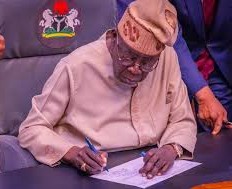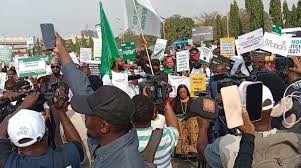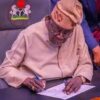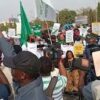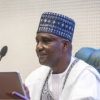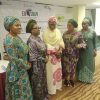A coalition under the EU Support for Democratic Governance Programme (EU-SDGN) II has stated that the 2025 Anambra State Governorship election was more peaceful and organised than prior polls, despite persistent issues like vote-buying and low turnout. In a joint statement, the Election Observation Hub (EOH)—a coalition of civil society organisations including Yiaga Africa, The
A coalition under the EU Support for Democratic Governance Programme (EU-SDGN) II has stated that the 2025 Anambra State Governorship election was more peaceful and organised than prior polls, despite persistent issues like vote-buying and low turnout.
In a joint statement, the Election Observation Hub (EOH)—a coalition of civil society organisations including Yiaga Africa, The Kukah Centre, International Press Centre (IPC), Centre for Media and Society (CEMESO), Nigerian Women Trust Fund (NWTF), ElectHer, and TAF Africa— collectively deployed 711 observers across all 21 local government areas in Anambra State.
The group commended improvements in different aspects of the election management, including logistics, security management, and technology deployment, but stressed that issues such as vote-buying, late commencement of the election in some areas and low voter turnout were some of the challenges faced in the concluded Anambra state 2025 governorship election.
According to their report, the election was calm and orderly across most polling units, with the professionalism of electoral and security officials contributing to the peaceful conduct. However, widespread vote-buying was observed, with verified cases of monetary inducement ranging between ₦3,000 and ₦15,000 per voter, depending on the area and competitiveness of parties.
For instance, in Anambra East and Awka North, political agents were seen offering cash to voters. The observers noted that such practices “erode equality in electoral competition and weaken the legitimacy of electoral victory,” urging authorities to strictly enforce anti-bribery provisions under the Electoral Act 2022.
Also, the report highlighted improvement in the punctuality of the officials of the Independent National Electoral Commission (INEC) who arrived on time in 49 per cent of polling units by 7:30 a.m., a significant improvement from the 17 per cent recorded in the 2021 governorship election. However, some polling units in Awka North, Ihiala, Ogbaru, Orumba North, and Nnewi North experienced delays due to logistical challenges, including a shortage of vehicles and security escorts for election materials.
By 9:30 a.m., 85% of polling units had begun accreditation and voting. BVAS functioned well in 90% of locations, with minor technical issues resolved quickly in about 8%. Some officials allowed voting without BVAS verification, raising concerns about transparency.
 Despite these, voter turnout remained low at 21.3 per cent, though it reflected a slight improvement over 2021. The report called for an urgent national dialogue on declining voter participation, particularly among young people.
Despite these, voter turnout remained low at 21.3 per cent, though it reflected a slight improvement over 2021. The report called for an urgent national dialogue on declining voter participation, particularly among young people.
The EOH praised the strong presence of journalists across the state and confirmed that media professionals operated freely. Out of 115 journalist-observers, none reported incidents of harassment or violence, except for one minor obstruction that was swiftly resolved.
The coalition also highlighted the work of fact-checking organisations such as Nigeria Democracy Report (NDR) and HaltFake.org, whose prompt responses helped to dispel misinformation circulating on social media during the election.
The Hub commended the Nigeria Police Force and other security agencies under the Inter-Agency Consultative Committee on Election Security (ICCES) for their professionalism and coordination. Security personnel were deployed in 96 per cent of polling units, contributing to the peaceful environment, while the absence of local vigilante groups such as Agu Ne Chemba and Ebube Agu was seen as a positive sign of institutional discipline.
Observers also applauded INEC for the efficient performance of its Election Results Viewing Portal (IReV), which uploaded 98 per cent of polling unit results by 7:00 p.m. on election day. Independent verification by Yiaga Africa’s Watching The Vote (WTV) initiative confirmed that INEC’s official results aligned with statistically verified estimates, suggesting that the announced outcome reflected the votes cast at polling units.
The coalition urged INEC to strengthen logistics planning, uphold ballot secrecy, and intensify voter education, especially targeting youth and women. It also called on the National Assembly to amend the Electoral Act to mandate electronic transmission of results and to establish an Electoral Offences Commission to investigate and prosecute election-related crimes.
Political parties were advised to eliminate vote-buying, promote gender inclusion, and practice internal democracy, while security agencies were encouraged to maintain gender-balanced deployments and protect journalist safety during future polls.
However, to ensure a free, fair and inclusive election in Nigeria, citing issues in the Anambra state 2025 governorship election, the coalition group made some recommendations for stakeholders ahead of future elections.
Recommendations for the Independent National Electoral Commission (INEC)
INEC, under its new leadership, should prioritise and enhance the efficiency of Election Day operations, particularly the timely deployment of election materials and personnel to ensure a credible voting process.
Strengthen measures that ensure the secrecy of the ballot, thereby upholding the integrity and confidentiality of the voting process.
INEC should increase targeted voter education and public awareness campaigns highlighting the importance of women’s full participation, while also enforcing the Electoral Act provisions against vote buying and intimidation that disproportionately affect female voters.
Promote Gender-Inclusive Practices: INEC should increase the number of female electoral officials, especially at senior levels.
Consolidate Logistics and Technological Gains: Maintain and expand robust deployment strategies, staff training, and contingency plans to ensure reliable BVAS functionality.
Strengthen Disability Data Validation and Support Services: INEC should periodically update and verify disability-disaggregated voter data to ensure the accurate provision of assistive tools and materials such as braille ballot guides, magnifying glasses, and tactile jackets.
Additionally, INEC should institutionalise the deployment of trained Sign Language Interpreters (SLIs) in polling units with registered deaf voters to ensure full accessibility and inclusion for the hearing-impaired community.
Improve on proactive disclosure of information and sustain periodic engagement with the media.
Recommendations for Security Agencies
Sustained enforcement of electoral laws and institutional reforms to strengthen accountability, voter education, and the deterrence of election-related offences in future polls.
Security personnel under the Inter-Agency Consultative Committee on Election Security (ICCES) should maintain a continuous and visible presence at polling units, from the start of accreditation through the conclusion of voting and results collation. Security deployment strategies should prioritise high-risk locations to prevent potential disruptions, voter intimidation, or disputes.
Ensure continuous journalist-safety protocols and media-friendly security engagements.
Ensure that female officers are adequately represented and visible in election deployments, as their presence promotes confidence among women voters and contributes to a safer, more inclusive polling environment.
Increase Presence and Responsiveness: Strengthen security presence in and around polling units to deter voter inducement, especially where vulnerable groups like PWDs are targeted.
Protect the Integrity of the Process: Act promptly on reports of vote trading, intimidation, or exploitation of persons with disabilities to preserve electoral fairness.
Recommendations for Political Parties
The group recommended ways through which political parties can improve electoral activities, such as:
Eradicate the unlawful monetisation of electoral activities and instead invest in practices that promote transparency, issue-based campaigns, and inclusive political and electoral participation.
Eliminating vote-buying and other forms of electoral commercialisation is essential to restoring public trust and ensuring credible, democratic elections.
Adopt and implement gender inclusion quotas to ensure that more women are supported and nominated as candidates, and strengthen internal democracy processes that enable equitable participation at all party levels.
Mainstream disability inclusion in party structures and campaign processes, ensuring accessibility during rallies and equitable representation of PWDs as candidates, party agents, and mobilizers.
The political parties of female candidates are encouraged to ensure the deployment of party agents to monitor and protect their interests at all levels of the electoral process.
Recommendations for the National Assembly
Some of the recommendations suggested for the National Assembly include:
Fulfil its commitment to electoral reform by amending the Electoral Act to mandate the electronic transmission of election results alongside the manual process. This reform is essential to improving the transparency, accuracy, and credibility of the results collation process.
Establishing an Electoral Offences Commission with the mandate to investigate, prosecute, and deter violations of electoral laws will enhance accountability, curb impunity, and bolster public confidence in Nigeria’s electoral process by ensuring timely and impartial justice for offenders.
Recommendations for the Media
Need to sustain Fact-Checking Integration and continue partnerships with NDR and HaltFake.org for real-time corrections.
Institutionalise of Election-Watch Media Hub: Establish permanent broadcast monitoring rooms for election-day coordination.
Recommendations for the Civil Society Organisations (CSOs)
Continue to hold democratic institutions to high standards of integrity, transparency, and accountability through collaborative approaches in election observation throughout the electoral cycles, extending beyond election day to include post-election audits, review and electoral advocacy.
Expand community-based mentorship and training programmes for women interested in politics, focusing on campaign strategy, fundraising, and public engagement to close the representation gap.
Sustain advocacy and voter education targeting both PWDs and the general electorate on the importance of inclusive participation and accessible voting environments.
Strengthen media monitoring and public accountability efforts to expose and deter voter manipulation or exploitation of PWDs.


